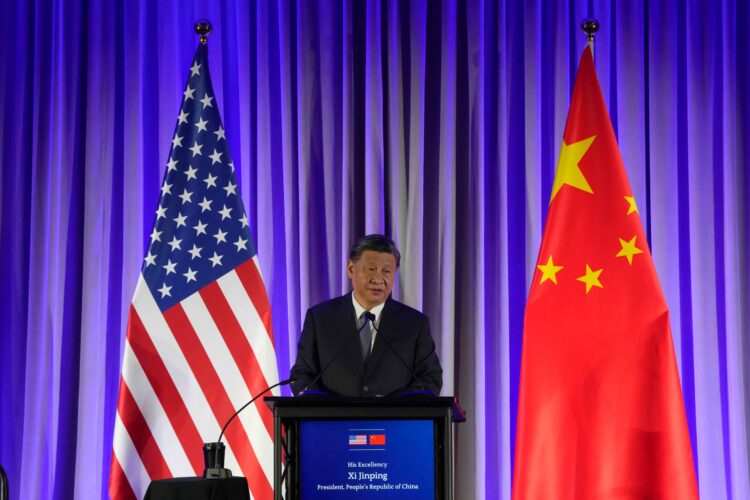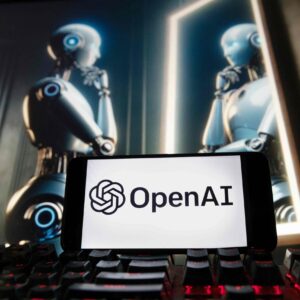Xi Jinping visited San Francisco for the Asia-Pacific Economic Cooperation (APEC) this week, meeting with US President Joe Biden and hundreds of American business leaders to discuss the current state of affairs between the two countries.
It was the first time Xi visited San Francisco since 1985, when he was a humble Communist Party chief in a small town. It was also the first time in six years that Xi visited the US.
Pointing to a photo in his phone with the Golden Gate Bridge in the background, President Biden asked President Xi, “Do you know this young man?” “Oh yes,” said President Xi, “this was 38 years ago.”🌞 pic.twitter.com/r65Em6Z7oS
— Hua Chunying 华春莹 (@SpokespersonCHN) November 16, 2023
Xi arrived in the Golden Gate city to much ado and fanfare on Tuesday, with clips going viral on social media. Carrying out his warm reception were dozens of people (whether they were American or Chinese is unclear) waving Chinese flags and banners.
Preparations for the APEC Summit ran into controversy when the city decided to clear away the notorious tent encampments of its homeless population. San Francisco’s crime levels were also highlighted when a Czech news crew attempting to cover the APEC event were robbed at gunpoint on Sunday.
On Wednesday, the two presidents and their administrations’ top officials descended on the Filoli historic estate and gardens south of the city for lunch and a series of discussions. Their conversations ranged from trade to the tensions in the South China Sea, the Russo-Ukraine War, and the COVID-19 pandemic.
(RELATED: China vs Taiwan – What Will Happen if China Invades?)
This APEC summit was the first in-person meeting between Biden and Xi since November 2022, when they attended the G20 Summit in Bali, Indonesia. Contact between the American and Chinese militaries have been virtually non-existent since the US shot down a Chinese spy balloon in February 2023. But tensions were already high due to former Speaker of the House Nancy Pelosi’s trip to Taiwan in August 2022.
To overcome these challenges, both sides have had to promise a lot in a series of bargains. Xi agreed to accept the US’s demands about fentanyl crackdowns, which has become an increasingly important domestic policy objective due to the drug’s massacre of the US population.
Another point of agreement has been the increase of renewable energy use to supplant fossil fuels. China has now agreed to acknowledge all greenhouse gas emissions including methane and nitrous oxide, rather than just carbon dioxide as it had done previously. An increase in military contact was also met with positive reception from both sides.
“I believe they were some of the most constructive and productive discussions we’ve had,” Biden said.
China was less willing to discuss joint AI regulations, since the US has begun to ramp up restrictions on exports of AI-capable technologies (especially advanced semiconductor chips) to China. These restrictions have already hurt Chinese commerce. Furthermore, the officials butted heads over Taiwan, which remains a highly competitive theater of the Chinese vs. American struggle for influence.
Later Wednesday night, as part of the APEC program, Xi attended a dinner with American corporate leaders at the Hyatt Regency hotel in downtown San Francisco. In attendance were BlackRock’s Larry Fink, Apple’s Tim Cook, and leaders from Qualcomm, Blackstone, Pfizer, Boeing, and other large American companies with expansive Chinese operations. Serial entrepreneur Elon Musk and Salesforce CEO Marc Benioff greeted Xi at a reception but did not attend the dinner.
Chinese billionaire Jack Ma was noticeably absent, despite having been brought by Xi to Seattle in 2015. Ma had been “disappeared” by the Chinese state following his dissent of certain practices. It was just recently announced that Jack Ma’s family trust is set to sell nearly a billion dollars in Alibaba shares.
Xi’s dinner with business leaders was an attempt to quell anxieties that Western executives have about doing business in China, caused by a pattern of businesspeople getting detained in China during visits. There is also anxiety about the growing trade war between China and the U.S. over microchips and AI technology, which Xi would like to overcome through “win-win” cooperation—or at least, that is what he wants to convince US corporations of.
Standing at the podium before the gathering of business leaders, Xi said:
“Whatever stage of development it may reach, China will never pursue hegemony or expansion, and will never impose its will on others. China does not seek spheres of influence, and will not fight a cold war or a hot war with anyone. China will remain committed to dialogue and oppose confrontations, and build partnerships instead of alliances. It will continue to pursue a mutually beneficial strategy of opening up. The modernization we are pursuing is not for China alone: we are ready to work with all countries to advance global modernization, featuring peaceful development, mutually beneficial cooperation, and common prosperity, and to build a community with a shared future for mankind.”
Do you believe him? https://t.co/0fHL4X4J5v
— PBD Podcast (@PBDsPodcast) November 16, 2023
Learn the benefits of becoming a Valuetainment Member and subscribe today!
Making headlines regarding the APEC Summit was Biden’s decision to answer in the affirmative that Xi Jinping is a “dictator.”
“Well, look, he is,” Biden said. “I mean he’s a dictator in the sense that he is the guy who runs a country which is a communist country based on a form of government totally different from ours.”
Secretary of State Antony Blinken was visibly upset by Biden’s remark, likely fearing that it could jeopardize much of the negotiations the two countries have in place.
Blinken’s face when Biden calls President Xi a dictator 🤣🤣🤣 pic.twitter.com/2sAPeGxwlZ
— Kim Dotcom (@KimDotcom) November 16, 2023
The Chinese Foreign Ministry immediately denounced the description, calling it “absurd” and a “provocation.”


















Add comment